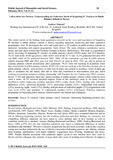| dc.description.abstract | This article reports on the findings from quantitative research on the views and experiences of beginning P1 teachers in public primary schools in Kenya regarding induction, mentoring and other supportive programmes. Aim: To investigate the views and experiences of P1 teachers in public primary schools on induction, mentoring and support programmes. Study design: The study adopted a quantitative survey design and took place in Kisii and Nyamira Counties in Kenya. Methodology: The study is a quantitative survey involving 24 beginning P1 teachers in public primary schools (45.8% males and 54.2 females). 70.2% were in the 30-40 age groups, while 20.8% were in the 41-51 one. 33.3% graduated between 1995 and 2000, while 66.7% graduated between 2001- 2006. All the respondents got jobs in public primary schools between 2009 and 2013, just over half (54.2%) of them in 2012. 75% got jobs in private or academy primary schools immediately after graduation. 79.2% were still teaching in academies when they secured jobs in public primary schools. 20.8% who were not teaching at the time they secured jobs in public primary schools, were involved in their own business (not related to teaching). Some of them got jobs in academies but left shortly after due to what they considered as mistreatment, poor pay, harsh working environment and poor working relationship with Teachers Service Commission (TSC) teachers. Result: 37.8% had induction when they started teaching at public primary schools which lasted between 1and 4 weeks. 41.7% received personal support. Some of the challenges cited in the study include insufficient and/or inadequate teaching materials (54%), reality shock (29%), dealing with individual differences (25%), classroom discipline (21%), motivating students (21%), relationships with parents (21%), assessing pupils‟ work (17%), dealing with problems of individual pupils (17%) organisation with class work (13%) and problems of experienced teachers (13%). Conclusion: Effective induction programme for beginning public primary school teachers was limited and inadequate. | en_US |

